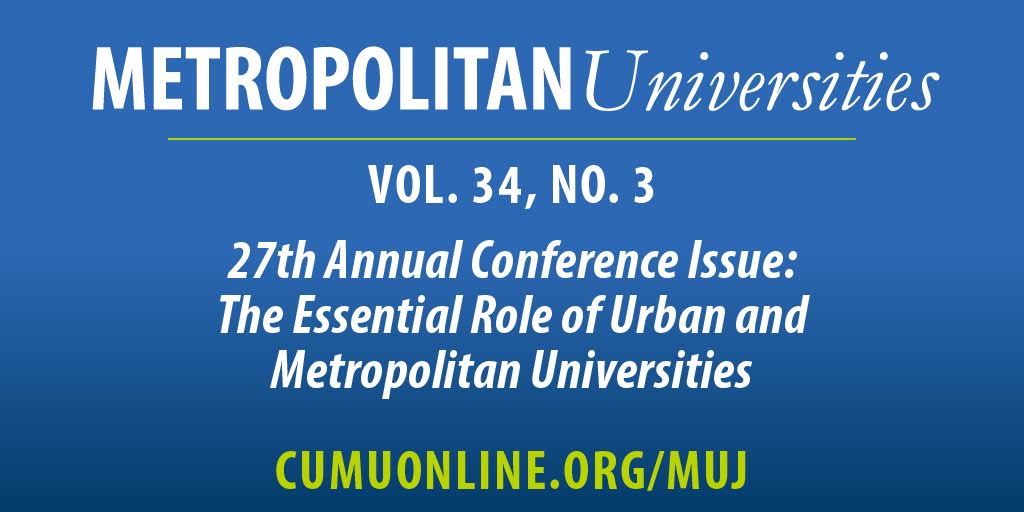The Scholar-Administrator Imperative:
Developing scholarship and research through practice to build the community engagement field
DOI:
https://doi.org/10.18060/26863Keywords:
scholar-administrator, experiential learning, community engagement, community engagement professional, practitioner scholar, scholar practitioner, community-based learningAbstract
Professional experiences in community engagement are often distinctly separated from educational theories and practices, yet the work of many community engagement professionals sits at the intersection of theory, practice, experience, and context. Intentionally and critically exploring this untapped third space offers an exploration into professional educational identity, practice, and scholarship. This exploration has indicated a gap between theory and practice and between professional experience and scholarship. Interrogating experience as a source of knowledge and recognizing the centrality of practice and context, this piece explores the scholar-administrator's potent role. Offering potential strategies for scholar-administrators to leverage their role through inquiry leading to scholarshiop, an inquiry framework is provided situating the need to fill the practice-theory gap as an imperative for the field.
References
References
Dostilio, L. D. (Ed.). (2017). The community engagement professional in higher education: A competency model for an emerging field. Campus Compact.
Green, P. M., Eddins, E. A., Berkey, B., & Meixner, C. (2018). Exploring the borderlands through collaborative inquiry: A narrative introduction. In B. Berkey, C. Meixner, P. M. Green, & E. E. Rountree (Eds.), Reconceptualizing faculty development in service-learning/community engagement: Exploring intersections, frameworks, and models of practice (pp.1–23). Stylus Publishing.
Green, Patrick M. (2021) "Making Explicit Connections between Experiential Learning and Justice: New Approaches to Teaching and Learning through an Imagination for Justice," Experiential Learning & Teaching in Higher Education: Vol. 4: No. 2, Article 5. Available at: https://nsuworks.nova.edu/elthe/vol4/iss2/5
Green, Patrick M.; Castor, Theresa; Leyburn, Dale J.; DeMaria, Don; and Jaime, Andres (2022) "Experiential Learning Educators as Tempered Radicals and Social Change Agents in Higher Education: The NSEE Fellows Program as Reflective Practitioner-Scholars," Experiential Learning & Teaching in Higher Education: Vol. 5: No. 1, Article 6.
Available at: https://nsuworks.nova.edu/elthe/vol5/iss1/6
Green, Patrick M.; Castor, Theresa; Leyburn, Dale J.; DeMaria, Don; and Jaime, Andres (2022) "Advocating for Experiential Learning Programs as Change Agents in Higher Education: Imagining a Justice Orientation that Centers Students and Partners while Enriching Practice," Experiential Learning & Teaching in Higher Education: Vol. 5: No. 1, Article 7.
Available at: https://nsuworks.nova.edu/elthe/vol5/iss1/7
Green, P.M., Bergen, D.J., Stewart, C.P., & Nayve, C. (2021). An Engagement of Hope: A Framework and Equity-Centered Theory of Action for Community Engagement. Metropolitan Universities, 32(2), 129-157. DOI: 10.18060/25527.
Green, P.M., Stewart, C.P., Bergen, D.J. & Nayve, C. (2020). Faith and Community Engagement at Anchor Institutions: Exploring the Intersection and Turning toward an Engagement of Hope. Metropolitan Universities, 31(3), 3-21. https://doi.org/10.18060/24784
Greene, M. (1995). Releasing the imagination: Essays on education, the arts, and social change. Jossey-Bass Publishers.
Heinrich W. F. & Green P. M. (2020). Remixing approaches to experiential learning, design, and assessment. Journal of Experiential Education, 43(2), 205–223. doi:10.1177/1053825920915608
Janke, E. M. (2019). Scholar-administrators as change agents. Metropolitan Universities, 30(2), 109–122.
Lytle, S. L. (2008). Practitioner inquiry and the practice of teaching: Some thoughts on “better.” Research in the Teaching of English, 42(3), 373-379.
http://ezproxy.msu.edu/login?url¼https://search.proquest.com/docview/215344856?accountid¼12598
Nash, R. J. (2004). Liberating scholarly writing: The power of personal narrative. Teachers College Press
Mills C. W. (1959). The sociological imagination. Oxford University Press.
Prophets of a Future Not Our Own downloaded at https://ignatiansolidarity.net/blog/2018/10/13/prophets-romero/
Ravitch, S. M. (2014). The transformative power of taking an inquiry stance on practice: Practitioner research as narrative and counter-narrative. Perspectives on Urban Education 11(1), 5–10.
Salipante, P. & Aram, J. D. (2003). Managers as knowledge generators: The nature of practitioner-scholar research in the nonprofit sector. Nonprofit Management and Leadership, 14, 129–150. https://doi.org/10.1002/nml.26
Schön, D. (1983). The reflective practitioner: How professionals think in action. Basic Books.
Whitchurch, C. (2013). Reconstructing identities in higher education: The rise of third space professionals. Routledge. https://doi.org/10.4324/9780203098301
Downloads
Published
Issue
Section
License
Copyright (c) 2023 Patrick M. Green

This work is licensed under a Creative Commons Attribution 4.0 International License.



